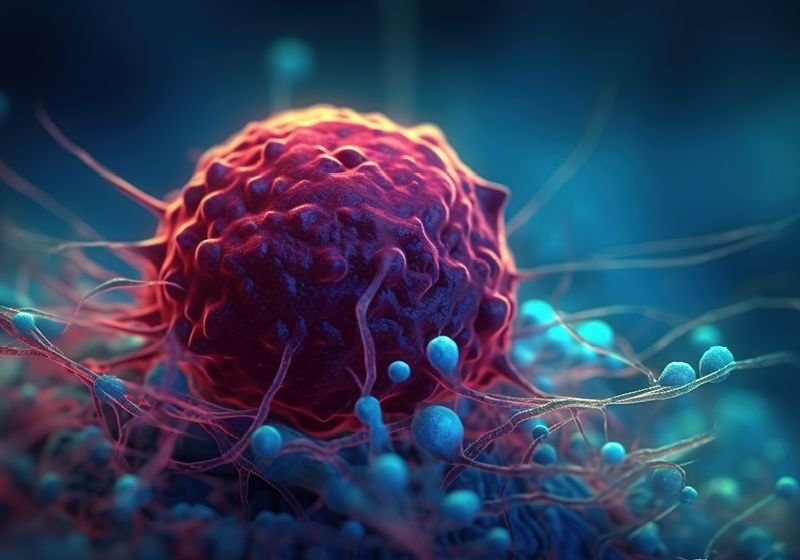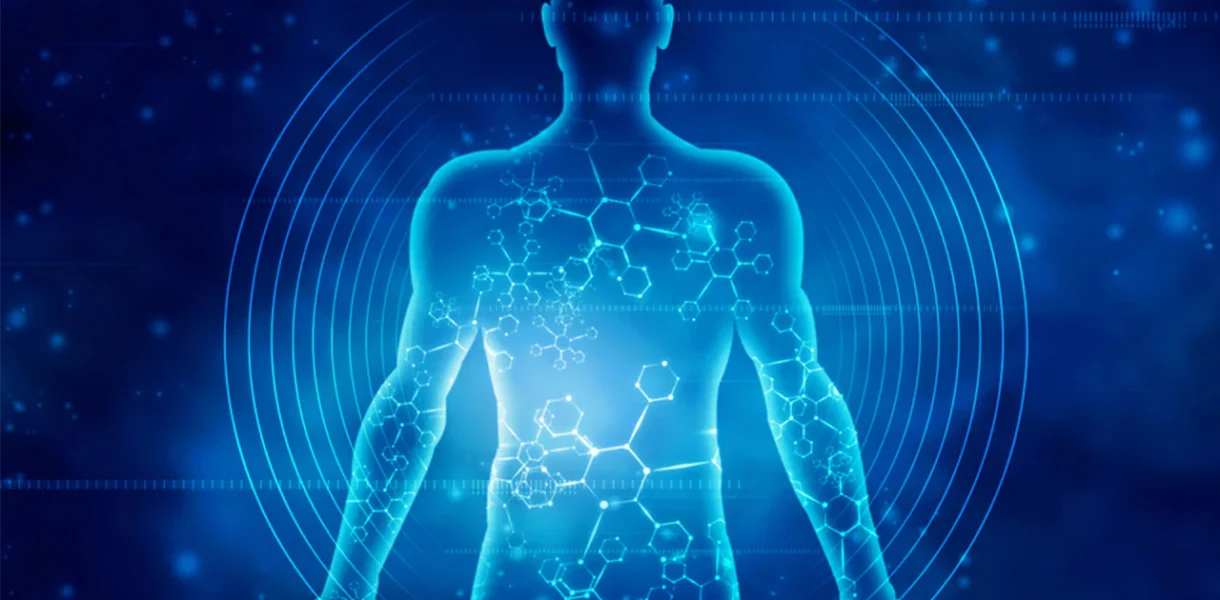Table of Contents
Autophagy, the cellular process of recycling and degrading damaged or unnecessary components, is increasingly recognized for its profound impact on human health. While autophagy offers a wide range of benefits, from improved metabolic function to neuroprotection, one of its most significant roles is in the context of cancer.
In this article, we’ll delve into the reasons why autophagy is so important for cancer patients. We’ll explore how this natural process can act as a tumor suppressor in the early stages of cancer development, as well as how it can promote cancer cell survival and therapy resistance in established tumors. Understanding the complex and context-dependent roles of autophagy in cancer is crucial for developing effective treatment strategies
What is autophagy?
Let’s talk about the most important benefit of autophagy—and this is going to surprise you! Now, if you’re not familiar with autophagy, it is a condition where your body is recycling damaged or old and not needed proteins in the body.
I’m not talking just about hair and muscle; I’m talking about those little enzyme protein machines that do the work of the body—those are the things that make body tissue, and they’re at the cellular level. When those are damaged, autophagy is a system to clean those out of the body and recycle them, okay?
In simpler terms:
- Autophagy is your body’s way of cleaning up damaged proteins and recycling them.
- These proteins are like tiny machines that keep your body functioning.
Autophagy benefits
Autophagy decreases the risk of chronic diseases. Autophagy will help recycle protein as a survival mechanism. For example, one of the triggers for autophagy is fasting, so that would be kind of a similar thing to starvation, so the body kicks in this mechanism to help become more efficient, so as to survive longer. So it’ll take the protein it doesn’t need, recycle it into new tissue, and even use it as fuel.
Autophagy as a survival mechanism:
- Helps the body survive when resources are scarce (like during fasting).
- Recycles unneeded protein into:
- New tissue
- Fuel
| Benefits of Autophagy |
|---|
| Decreases risk of chronic disease |
| Recycles protein as a survival mechanism |
| Makes the body more efficient |
| Recycles unneeded protein into new tissue |
| Uses recycled protein as fuel |
Also, autophagy can help reduce pathogens in the body and it protects the neurons as a survival mechanism, the heart cells, and it gets rid of what’s called advanced glycation end-products, which basically means like sticky proteins that clog things up, as well as plaquing in the brain. So it cleans up all this damaged protein in the cells; that’s what autophagy is.
Additional benefits of autophagy:
- Helps reduce pathogens (harmful microorganisms).
- Protects neurons (brain cells).
- Protects heart cells.
- Gets rid of advanced glycation end-products (AGEs):
- AGEs are sticky proteins that can build up in the body.
- They can contribute to various health problems, including clogged arteries and brain plaque.
The most important benefit of autophagy
But the most important function of autophagy is anti-cancer. So let me explain this. Now, the difference between a normal cell and a cancer cell has to do with this one thing, and that has to do with this: in a normal cell you have respiration in the mitochondria. What does that mean? Well, fuel is converted through a machine to make energy—currency of the body—it’s called ATP.
So your fuel, like glucose, that uses oxygen to then be burned, and that’s the energy currency of the body. So in a normal cell, you have something called mitochondrial respiration. The mitochondria is the energy factory, and respiration has to do with breathing or oxygen, okay? So a normal cell needs oxygen to generate fuel.
Key takeaway:
Now, in a cancer cell there’s damage to this respiratory mechanism, so this motor with a carburetor that uses oxygen is broken, okay? There’s irreversible damage. So what happens when you damage that system?
As a survival mechanism, this cell starts to activate an ancient pathway that is able to ferment glucose, which basically is a way of breaking it down differently without the use of oxygen. Now, whether there’s oxygen or not, that has nothing to do with it; glucose fermentation doesn’t necessarily need oxygen to make its energy.

What happens in cancer cells:
- The respiratory mechanism (which uses oxygen to create energy) gets damaged.
- The cell switches to an ancient pathway that ferments glucose without needing oxygen.
Comparison of Normal Cells and Cancer Cells
| Normal Cells | Cancer Cells |
|---|---|
| Use mitochondrial respiration | Use glucose fermentation |
| Require oxygen | Don’t necessarily need oxygen |
| Use respiratory center | Activate ancient pathway |
| Efficient energy production | Less efficient energy production |
So that is the difference between a cancer cell and a normal cell: normal cells use oxygen in the respiratory center – this is a fancy name for it right here – and cancer cells basically ferment glucose without oxygen.
In short:
- Normal cells: Use oxygen for energy.
- Cancer cells: Ferment glucose without needing oxygen.
Cancer cells love glucose

One of the ways that they test for cancer is through a PET scan, and a PET scan, they are measuring extreme glucose consumption. Cancer cells are extremely hungry for glucose; they hog glucose more than normal cells, and sometimes you will starve the normal cells. Now just by knowing that simple fact right there, why would anyone want to consume a lot of glucose or sugar if they have cancer?
Why you should avoid sugar if you have cancer:
- Cancer cells thrive on glucose (sugar).
- Consuming a lot of sugar can feed cancer cells and potentially starve normal cells.
Why is there damage to the mitochondria?
Now, the other question asked is why is there damage in this part of the mitochondria. Well, my theory is that it has something to do with the DNA that gets damaged because what’s unique about the mitochondria is that the mitochondria has its own DNA. Hey, it’s called mitochondrial DNA versus the DNA in the nucleus of the cell, which is highly protective.
Key takeaway:
- The mitochondria (the cell’s energy factories) have their own DNA.
Mitochondrial DNA vs Nuclear DNA
| Mitochondrial DNA | Nuclear DNA |
|---|---|
| Located in mitochondria | Located in cell nucleus |
| Less protected | Highly protected |
| More prone to mutation | Less prone to mutation |
| Can use nuclear DNA | – |
The DNA in the mitochondria are much more prone to mutation or alteration because they’re not as protected. Now, the mitochondria can use the DNA from the nucleus of the cell, but it also has its own DNA, and I think that’s really why it becomes damaged, because it’s simply not protected.
Why mitochondrial DNA is vulnerable to damage:
- It’s not as protected as the DNA in the cell’s nucleus.
Can autophagy clean up the damage?
You cannot get cancer in your body unless there’s damage to this respiratory part of the mitochondria. What does all this mean? It means that autophagy has the ability to clean up this damage in your mitochondria because these are protein machines, these are enzymes. The protein damage in the mitochondria that causes the cells to shift can be cleaned up by autophagy.
The Link Between Autophagy, Mitochondria, and Cancer:
- Damage to the respiratory part of the mitochondria is essential for cancer development.
- Autophagy can clear out this damage by removing the damaged proteins and enzymes in the mitochondria.
So that makes this benefit—anti-cancer—the most important benefit of autophagy.
key Points
What is autophagy?
Autophagy is a condition where your body is recycling old and damaged proteins in the body. I’m not talking just about hair and muscle. I’m talking about those little enzyme protein machines that do the work of the body. They’re at the cellular level, and they make body tissue.
Benefits of autophagy:
• It decreases the risk of disease
• It will help recycle protein as a survival mechanism
• It can help reduce pathogens in the body
• It protects neurons and heart cells
• It gets rid of advanced glycated end products and amyloid plaquing
**The most important benefit of autophagy is anti-cancer.
The difference between a normal cell and a cancer cell has to do with this one thing.
A normal cell has something called mitochondrial respiration.
A cancer cell has damage to this respiratory mechanism. When you damage this system, the cell starts to activate an ancient pathway that’s capable of fermenting glucose without the use of oxygen.
Cancer cells are hungry for glucose. Why would anyone want to consume a lot of sugar or glucose if they have cancer?
But why is there damage to the respiratory mechanism in the mitochondria? My theory is that it has something to do with the DNA that gets damaged. I believe it gets damaged because it’s simply not protected. Autophagy may have the ability to clean up this damage in the mitochondria.
DATA
Tumors-and-Mitochondrial-Respiration-A-Neglected
inhibition_of_mitochondrial_DNA_repair
FAQ
Why is autophagy important in cancer patients?
Autophagy plays a crucial role in cancer patients for several reasons:
- Tumor Suppression: In the early stages of cancer development, autophagy can act as a tumor suppressor by degrading damaged organelles, misfolded proteins, and other potentially oncogenic materials, preventing them from fueling tumor growth[1][3].
- Tumor Progression: However, in established tumors, autophagy can promote cancer cell survival by providing metabolic resources and clearing damaged cellular components during periods of stress, such as nutrient deprivation or hypoxia[1][2].
- Therapy Resistance: Autophagy can also contribute to cancer drug resistance by allowing tumor cells to adapt to the stresses induced by chemotherapy or targeted therapies, making it an important factor in cancer treatment outcomes[1][4].
- Metastasis: Autophagy has been linked to the epithelial-mesenchymal transition and increased invasiveness of cancer cells, thereby promoting metastasis[3].
- Cancer Stem Cells: Autophagy is involved in the maintenance of cancer stem cell properties, such as self-renewal and drug resistance, which can lead to tumor recurrence[3].
Understanding the complex and context-dependent roles of autophagy in cancer is crucial for developing effective therapeutic strategies that can target this process to improve outcomes for cancer patients[1][2][4].
What is the role of autophagy in cancer metabolism?
Autophagy plays a crucial role in regulating cancer cell metabolism in several ways:
Metabolic Adaptation
- In the face of nutrient deprivation or other stressors, autophagy allows cancer cells to recycle cellular components to generate energy and metabolic precursors, enabling them to adapt and continue proliferating[3][4].
Mitochondrial Homeostasis
- Autophagy selectively degrades damaged or dysfunctional mitochondria, maintaining mitochondrial integrity and supporting the metabolic needs of rapidly dividing cancer cells[3].
Metabolic Reprogramming
- Autophagy can contribute to the metabolic reprogramming of cancer cells, such as the shift towards aerobic glycolysis (the Warburg effect), which provides cancer cells with a growth advantage[3][4].
Nutrient Scavenging
- Autophagy allows cancer cells to scavenge and recycle nutrients from the tumor microenvironment, which can be scarce due to the rapid proliferation of tumor cells[3].
Cancer Stem Cell Metabolism
- Autophagy is important for maintaining the metabolic state of cancer stem cells, which often have unique metabolic requirements for self-renewal and tumor initiation[3].
By regulating these various aspects of cancer cell metabolism, autophagy can significantly impact tumor growth, survival, and response to therapy, making it an important target for cancer treatment[1][2][4].
What are the benefits of autophagy in healing?
Autophagy, the cellular process of degrading and recycling damaged or unnecessary cellular components, can provide several benefits in the context of healing and tissue repair:
- Cellular Homeostasis: Autophagy helps maintain cellular homeostasis by removing damaged organelles, misfolded proteins, and other cellular waste, which can accumulate during injury or disease[5].
- Metabolic Adaptation: Autophagy can provide metabolic resources, such as amino acids and lipids, to support the increased energy demands of cells during the healing process[5].
- Stem Cell Function: Autophagy is important for the maintenance and function of stem cells, which play a crucial role in tissue regeneration and repair[5].
- Immune Response: Autophagy can modulate the immune response, enhancing the clearance of pathogens and promoting the activation of immune cells involved in the healing process[5].
- Wound Healing: Autophagy has been shown to promote wound healing by supporting the migration and proliferation of skin cells, as well as the formation of new blood vessels[5].
- Tissue Regeneration: In some cases, autophagy can contribute to the regeneration of damaged tissues, such as the liver, by supporting the proliferation and differentiation of progenitor cells[5].
- Neuroprotection: Autophagy can help protect neurons and support neuronal function, which is important for the healing of injuries to the nervous system[5].
By maintaining cellular homeostasis, supporting metabolic adaptation, and modulating the immune response, autophagy can play a beneficial role in various healing and regenerative processes throughout the body[5].
What are the maximum benefits of autophagy?
Autophagy, the cellular process of degrading and recycling damaged or unnecessary cellular components, can provide a wide range of potential benefits, some of which include:
- Cellular Homeostasis and Organelle Maintenance: Autophagy helps maintain cellular health by removing damaged organelles, misfolded proteins, and other cellular waste, preventing their accumulation and potential toxicity[5].
- Metabolic Adaptation and Energy Production: Autophagy can provide metabolic resources, such as amino acids and lipids, to support cellular energy production and adaptation to nutrient-deprived or stressful conditions[3][5].
- Stem Cell Function and Tissue Regeneration: Autophagy is important for the maintenance and function of stem cells, which can contribute to tissue repair and regeneration[5].
- Immune System Modulation: Autophagy can enhance the clearance of pathogens and promote the activation of immune cells, thereby supporting the immune response[5].
- Neuroprotection and Neuronal Function: Autophagy can help protect neurons and support neuronal function, which is important for the healing of injuries to the nervous system[5].
- Cancer Prevention and Treatment: In the early stages of cancer development, autophagy can act as a tumor suppressor by degrading potentially oncogenic materials. In established tumors, autophagy can also promote cancer cell survival and contribute to therapy resistance[1][3].
- Longevity and Healthy Aging: Autophagy has been associated with increased lifespan and healthier aging by maintaining cellular function and clearing age-related cellular damage[5].
- Cardiovascular Health: Autophagy plays a role in maintaining cardiovascular function and can help protect against conditions like heart disease and stroke[5].
The maximum benefits of autophagy depend on the specific context and the balance between its roles in different cellular processes. Harnessing the full potential of autophagy for therapeutic purposes remains an active area of research[1][2][4].
Does autophagy kill cancer cells?
Autophagy can have both pro-survival and pro-death roles in the context of cancer, depending on the stage of tumor development and the specific cellular context.
Tumor Suppression:
- In the early stages of cancer development, autophagy can act as a tumor suppressor by degrading damaged organelles, misfolded proteins, and other potentially oncogenic materials, preventing them from fueling tumor growth[1][3].
- This tumor-suppressive function of autophagy can lead to the death or inhibition of cancer cells, especially in the initial stages of tumorigenesis[1][3].
Tumor Promotion:
- However, in established tumors, autophagy can promote cancer cell survival by providing metabolic resources and clearing damaged cellular components during periods of stress, such as nutrient deprivation or hypoxia[1][2].
- In this context, autophagy can help cancer cells adapt to their hostile microenvironment and continue proliferating, rather than directly killing them[1][2].
Therapy Resistance:
- Autophagy can also contribute to cancer drug resistance by allowing tumor cells to adapt to the stresses induced by chemotherapy or targeted therapies, making it an important factor in cancer treatment outcomes[1][4].
Selective Autophagy:
- Certain forms of selective autophagy, such as mitophagy (the degradation of damaged mitochondria) or aggrephagy (the clearance of protein aggregates), can specifically target and eliminate cancer cells under specific conditions[3].
So, while autophagy can have a tumor-suppressive effect in the early stages of cancer, it can also promote cancer cell survival and therapy resistance in established tumors. The overall impact of autophagy on cancer cell death depends on the specific cellular context and the stage of tumor development[1][2][3][4].
Benefits of autophagy
Autophagy, the cellular process of degrading and recycling damaged or unnecessary cellular components, can provide a wide range of benefits, including:
- Cellular Homeostasis and Organelle Maintenance: Autophagy helps maintain cellular health by removing damaged organelles, misfolded proteins, and other cellular waste, preventing their accumulation and potential toxicity[5].
- Metabolic Adaptation and Energy Production: Autophagy can provide metabolic resources, such as amino acids and lipids, to support cellular energy production and adaptation to nutrient-deprived or stressful conditions[3][5].
- Stem Cell Function and Tissue Regeneration: Autophagy is important for the maintenance and function of stem cells, which can contribute to tissue repair and regeneration[5].
- Immune System Modulation: Autophagy can enhance the clearance of pathogens and promote the activation of immune cells, thereby supporting the immune response[5].
- Neuroprotection and Neuronal Function: Autophagy can help protect neurons and support neuronal function, which is important for the healing of injuries to the nervous system[5].
- Cancer Prevention and Treatment: In the early stages of cancer development, autophagy can act as a tumor suppressor by degrading potentially oncogenic materials. In established tumors, autophagy can also promote cancer cell survival and contribute to therapy resistance[1][3].
- Longevity and Healthy Aging: Autophagy has been associated with increased lifespan and healthier aging by maintaining cellular function and clearing age-related cellular damage[5].
- Cardiovascular Health: Autophagy plays a role in maintaining cardiovascular function and can help protect against conditions like heart disease and stroke[5].
The benefits of autophagy are wide-ranging and depend on the specific cellular context and the balance between its various roles in different physiological and pathological processes[1][3][5].
Does autophagy prevent cancer?
Autophagy can have both tumor-suppressive and tumor-promoting roles in the context of cancer, depending on the stage of tumor development and the specific cellular context.
Tumor Suppression:
- In the early stages of cancer development, autophagy can act as a tumor suppressor by degrading damaged organelles, misfolded proteins, and other potentially oncogenic materials, preventing them from fueling tumor growth[1][3].
- This tumor-suppressive function of autophagy can help prevent the initiation and early progression of cancer[1][3].
Tumor Promotion:
- However, in established tumors, autophagy can promote cancer cell survival by providing metabolic resources and clearing damaged cellular components during periods of stress, such as nutrient deprivation or hypoxia[1][2].
- In this context, autophagy can support the growth and progression of existing tumors[1][2].
Therapy Resistance:
- Autophagy can also contribute to cancer drug resistance by allowing tumor cells to adapt to the stresses induced by chemotherapy or targeted therapies, which can hinder the effectiveness of cancer treatments[1][4].
Context-Dependent Role:
- The overall impact of autophagy on cancer development and progression is complex and context-dependent, with autophagy playing both tumor-suppressive and tumor-promoting roles at different stages of the disease[1][2][3].
While autophagy can help prevent the initiation and early progression of cancer, it can also support the growth and survival of established tumors, as well as contribute to therapy resistance. Targeting autophagy in cancer treatment is an active area of research, with the goal of harnessing its tumor-suppressive potential while mitigating its tumor-promoting effects[1][2][3][4].
Is 16 hours fasting enough for autophagy?
The duration of fasting required to induce significant autophagy can vary depending on several factors, but 16 hours of fasting may be sufficient to trigger some degree of autophagy in the body.
Here’s a more detailed overview:
- Autophagy is a cellular process that is upregulated during periods of nutrient deprivation, such as fasting, to provide the cell with energy and building blocks by recycling damaged or unnecessary cellular components[5].
- The onset of autophagy is typically observed after several hours of fasting, as the body shifts from using glucose as the primary fuel source to utilizing stored fat and protein reserves[5].
Timing of Autophagy Induction:
- Studies suggest that autophagy can begin to be significantly upregulated after around 12-16 hours of fasting in humans[5].
- However, the exact timing can vary depending on factors such as an individual’s metabolic state, age, and overall health[5].
Extent of Autophagy:
- While 16 hours of fasting may be sufficient to induce some degree of autophagy, the extent and magnitude of the autophagic response can continue to increase with longer fasting durations, up to around 24-48 hours[5].
- Prolonged fasting (e.g., 24-48 hours) may lead to more robust and widespread autophagy throughout the body[5].
Individual Variability:
- The individual response to fasting and the induction of autophagy can vary significantly from person to person, depending on factors such as genetics, lifestyle, and overall metabolic health[5].
So, in summary, 16 hours of fasting may be enough to trigger some level of autophagy in the body, but the extent and duration of the autophagic response can be influenced by various individual factors. Longer fasting periods may be required to achieve more substantial and widespread autophagy[5].
Side effects of autophagy
While autophagy is generally considered a beneficial cellular process, there can be some potential side effects or drawbacks associated with excessive or dysregulated autophagy:
- Cellular Damage: In some cases, excessive or uncontrolled autophagy can lead to the degradation of essential cellular components, resulting in cellular dysfunction or even cell death[5].
- Neurodegeneration: Impaired autophagy has been linked to the development of neurodegenerative diseases, such as Alzheimer’s, Parkinson’s, and Huntington’s disease, due to the accumulation of toxic protein aggregates[5].
- Immune Dysfunction: Dysregulation of autophagy can disrupt the normal functioning of the immune system, leading to autoimmune disorders or impaired immune responses to infections[5].
- Cancer Progression: While autophagy can have a tumor-suppressive role in the early stages of cancer, it can also promote the survival and growth of established tumors, potentially contributing to cancer progression and therapy resistance[1][3].
- Muscle Wasting: Excessive autophagy in skeletal muscle can lead to muscle atrophy and weakness, which can be a concern in certain medical conditions, such as cancer cachexia[5].
- Metabolic Disorders: Disruption of autophagy has been linked to the development of metabolic disorders, such as type 2 diabetes, due to its role in regulating insulin sensitivity and glucose homeostasis[5].
- Aging and Longevity: While moderate autophagy is associated with healthy aging, excessive or dysregulated autophagy may contribute to the development of age-related diseases and a shorter lifespan[5].
It’s important to note that the potential side effects of autophagy are often context-dependent and can vary based on the specific cellular and physiological context. Maintaining a balanced and regulated autophagy process is crucial for optimal cellular and organismal health[5].
Signs of Autophagy Fasting
During a fasting period, there are several potential signs that may indicate the induction of autophagy:
- Increased Bowel Movements: One sign of enhanced autophagy can be having an “extra” bowel movement during the fasting period. This is thought to be due to the body’s increased ability to remove waste products.
- Eye Debris: Increased debris around the eyes upon waking, consisting of mucus, oil, and skin cells, may be a sign of autophagy taking place.
- Musculoskeletal Releases: Spontaneous muscle releases or energetic impulses during the fasting period can be a subtle sign of autophagy.
- Metallic Taste: A change in breath smell to a more “metallic” scent due to the production of ketones like acetone can indicate increased autophagy.
- Increased Energy and Focus: Autophagy can provide the body with energy by recycling cellular components, which may lead to a sense of increased energy and mental focus during the fasting period.
Autophagy Definition
Autophagy is the natural, regulated process in which damaged or unnecessary cellular components are broken down and recycled. It is a lysosome-dependent mechanism that allows the orderly degradation and recycling of cellular components.
Is Autophagy Good or Bad?
Autophagy is generally considered a beneficial process, as it helps maintain cellular homeostasis, remove damaged organelles and proteins, and provide metabolic resources during times of stress or starvation. However, dysregulation of autophagy has been linked to various diseases, including:
- Neurodegeneration: Impaired autophagy is associated with conditions like Alzheimer’s, Parkinson’s, and Huntington’s disease.
- Cancer: Autophagy can have both tumor-suppressive and tumor-promoting effects, depending on the stage of cancer development.
- Metabolic Disorders: Disruption of autophagy has been linked to the development of conditions like type 2 diabetes.
The overall impact of autophagy on health is complex and context-dependent. Maintaining a balanced and regulated autophagy process is crucial for optimal cellular and organismal health.




